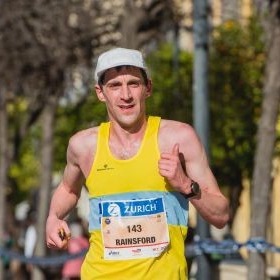
Chris Rainsford
Seville Marathon
Chris' headline numbers
Chris' strategy
Fueling
Carbohydrate is the main fuel you burn when racing. Failing to fuel properly is a leading cause of underperformance in longer races.
Chris managed to stick to his fueling plan throughout the race to maintain his energy levels. He successfully navigated a slight drop in energy towards the halfway mark and got his energy levels back up to finish strong. Chris admitted that he didn’t practise his fueling strategy prior to the race, and had only consumed a maximum of three PF 30 Gels during his longer training runs. Ahead of future races, we would recommend he includes some targeted gut training sessions to minimise the risk of any GI upset, despite not having any issues in this particular race in these conditions.
Hydration
Taking on board an appropriate amount of fluid and sodium is essential to maintaining blood volume and supporting the cardiovascular effort needed to perform on race day.
Whilst the absolute amount of sodium and fluid consumed per hour is important, it’s critical to consider these in relation to each other. This is known as 'relative sodium concentration' and it’s expressed in milligrams per litre (mg/L). How much sodium you’re taking in per litre of fluid is more important than the absolute amount taken in per hour.
Chris used the elite athlete aid stations (placed every 5km) to collect his own bottles. He took regular sips of PH 1000 as a ‘chaser’ with his gels. Thankfully, Chris had no issues with cramping until the last ~300m, which was likely due to a quick increase in pace to the finish line. This suggests he stuck to his fluid targets and nailed his hydration strategy. Based on his performance, subjective feedback and ability to tolerate this volume of fluid, we wouldn't recommend Chris alters anything.
Caffeine
Beyond the Three Levers of Performance (carb, sodium and fluid), caffeine is one of only a few substances that is proven to improve performance for most endurance athletes as it can help stave off mental and physical fatigue.
Chris had a minimal amount of caffeine on race day. He had a small cup of coffee on the morning of the race but chose not to take any further amount whilst running. Even though caffeinated products are commonly used in endurance sports for their ergogenic benefits, it’s important for each athlete to work out if caffeine is right for them. The potential side effects experienced by some may outweigh the ergogenic benefits in Chris’s case, for instance. Having trialled using caffeine in some of his training sessions, he may want to revisit this aspect of his nutrition, paying particular attention to dosing within the recommended 3-6 milligrams per kg of bodyweight, increasing his dose gradually over time.
How Chris hit his numbers
Here's everything that Chris ate and drank on the day...
Chris' weapons of choice
Final thoughts
Chris' full stats
Data Confidence?
There is an adequate level of accuracy in the data collected and the numbers reported. The athlete manages to recall what they ate and drank including most specifics (brands flavours quantities plausible estimations of volumes). However there are estimations made within the data which affect the overall confidence level in the data reported.